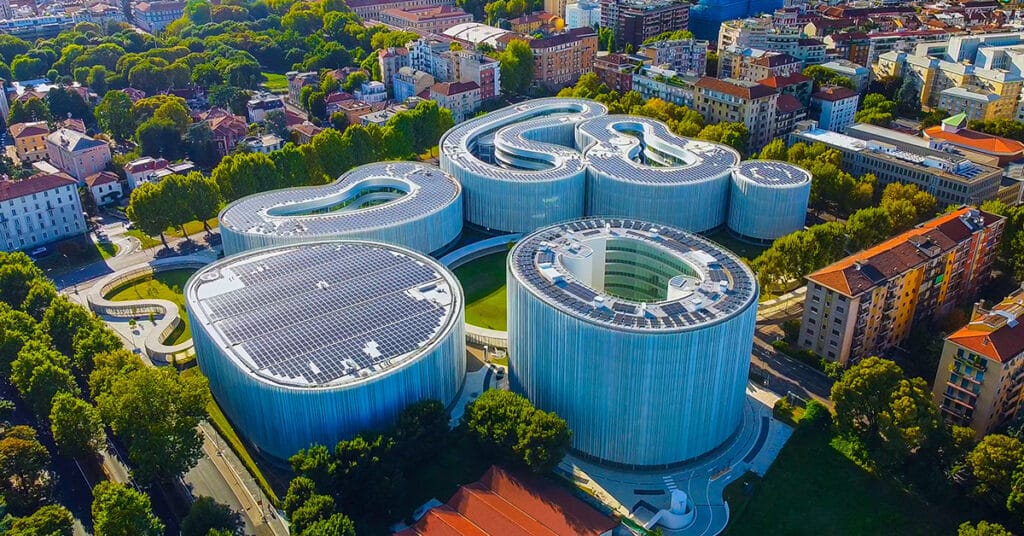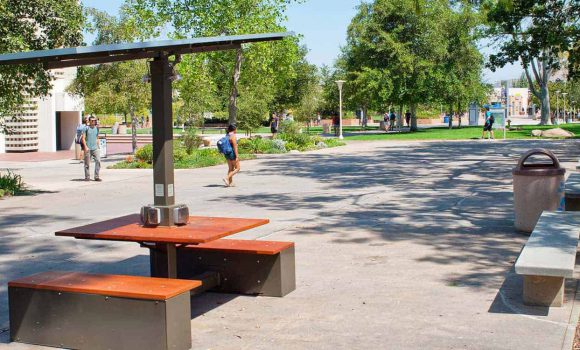While sustainable initiatives continue to permeate university building projects worldwide, a new kind of campus has begun to match the enthusiasm of the academic sector when it comes to “green” building – the corporate kind. Many of the world’s biggest brands have begun to plant the seeds of what it is to be the workplace of the future, one in which carbon footprints are smaller, and creating a healthy, safe environment for employees is part of the key to business success. Below is a short list of some of the top sustainable corporate campuses throughout the United States. Take a look at some of the innovative practices they have created:
FedEx Express
Memphis, TN
- Recipient of the LEED Gold Existing Building Operations & Maintenance Award in 2011 (the first in Memphis) as well as the EPA Energy Star Award
- Reduced water usage with low-flow aerators on all restroom sinks and flush valves on all toilets
- Installation of high-efficiency air filters in all air handling equipment maximizes use of outside air to lower the load on heating and cooling systems
- Energy efficient lamps connect to a computer controlled system to turn lights on and off at predetermined times, saving approximately $150,000 per year in energy costs
- An aluminum and glass curtain wall system utilizes tinted low-E insulated glass to reduce solar heat gain inside the building
- The facility hosts one of the few certified Arboreta in Tennessee as well as a series of jogging trails
Apple
Cupertino, CA
- Campus 2 is currently having the finishing touches put on it, expected to be the “greenest building on the planet”, essentially functioning as its own city with its own energy plant
- Apple is reusing 90% of its old headquarters and transforming the former Hewlett-Packard campus (a space that’s mostly asphalt), into a “lush and green hideaway that influences employee thinking”
- The new design aims for natural ventilation for 75% of the year to reduce heating and cooling costs
- Alternative energy sources will power the campus, Apple pledges to use 100% renewable
- The new campus will recycle water and use 13,300 feet of pipeline to share the supply between it and Cupertino
- The company is building a network of tunnels to link its old and new campuses, allowing employees to walk between them without cars
Mountain View, CA
- This year Google will reach 100% renewable energy for their r global operations, including data centers and offices
- Google is one of the first corporations to create large-scale, long-term contracts to buy renewable energy directly and it is the first company to purchase all of their electricity from a wind farm
- Recipient of the City of Mountain View’s first-ever LEED Platinum certification, with 10 more LEED-certified projects
- Google is the world’s largest corporate buyer of renewable power, with commitments reaching 2.6 gigawatts (2,600 megawatts) of wind and solar energy
- Green commuting options include a car-sharing program with electric vehicles, shuttles, and a rewarding program for walking or biking to work
Adobe
San Jose, CA
- 70% of Adobe workspaces are LEED certified for a total of 25 buildings — 17 of those are Platinum certified
- Completed more than 180 energy efficiency projects that have reduced electricity use by 50%, natural gas use by 30%, domestic water use by 79%, and irrigation water use by 71%
- Eco-friendly bathrooms feature water-less urinals and automatic flush valves
- 20 Windspire wind turbines were installed to capture the energy of the wind speeding up as it flows between the three office towers
- In 2014, Adobe became the first Fortune 500 company to install and manage an energy intelligence system which provides real-time data analytics that allow employees to automatically respond to spikes in the building’s electricity use and draw on previously stored power to reduce energy costs
Bank of America
New York, NY
- The first skyscraper of its kind to receive a LEED Platinum rating, the building produces net zero carbon dioxide emissions
- The building is made from renewable, recycled raw materials from within 500 miles of the city; air filtration system vents clean air back into the city, allowing the building to function as one huge air filter for New York City
- Using its own cogeneration plant, the building creates 70% of its energy needs
- Water doesn’t go to waste, thanks to the reuse of rainwater, water-less urinals, and low-flow fixtures
- From 2010 to 2015, the company reduced its greenhouse gas emissions by 37%, primarily through implementing energy efficiency projects, consolidating space, and leveraging a less carbon-intensive grid
- Member of the U.S. Department of Energy’s “Workplace Charging Challenge,” in which companies commit to adding charging stations for electric vehicles in their parking facilities
Biogen Idec
Cambridge, MA
- Carbon neutral company since 2014, pursues zero waste to landfill
- To balance the climate impact associated with fuels within the Biogen supply chain, business travel, and employee commuting, Biogen purchases a matching amount of carbon offsets
- In 2015, 61% of Biogen’s waste was diverted (composted, recycled, donated or recovered for energy by anaerobic digestion), with the rest primarily going to waste-to-energy
- Alliance with MIT’s Sloan School of Management to help companies embed sustainability into their organizations
- In 2016 Biogen engaged with 20 suppliers, which represented 45% of their supply chain carbon emissions to ensure accurate accounting of their footprint, and decrease their overall carbon footprint by 8%
Intel
Santa Clara, CA
- Reduced greenhouse gas emissions and investments in energy conservation have resulted in savings of 1.75 billion kWh
- Facilitated the construction of 18 solar electric installations at Intel locations around the world, generating more than 10 million kWh of clean solar energy per year
- Largest voluntary purchaser of green power in the U.S., according to the U.S. EPA’s Green Power Partnership rankings
- Purchased 3.1 billion kWh of green power in 2013, enough to meet 100% of U.S. electricity usage for a year
- Since 1998, Intel has invested more than $220 million in conservation programs, helping save more than 46 billion gallons of water
- Recycle more than 75% of the total waste generated in their operations
We are proud to see companies taking the initiative to promote sustainable business practices, but also amazed by some of the unique green innovations they have created. Based on what we have seen so far, we feel the best is only yet to come!
For information on how to make your corporate campus more sustainable email us at info@gosunbolt.com or call 267.419.8496.



